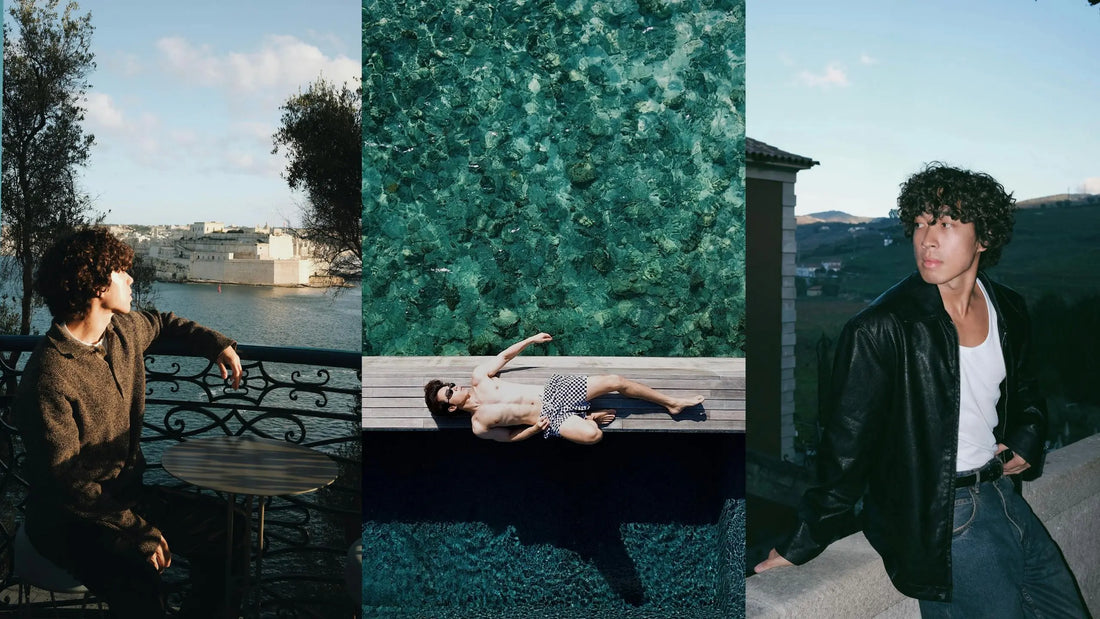That is what comes to the writer’s mind when talking with Tran Phi Do – a travel curator who has the appearance of a solitary traveler, but tells stories of journeys full of connection. His trips are obviously attractive and emotional, like the summer sunset, brilliant and gentle.

An ambiguous title
From an outside perspective, it is easy to imagine Tran Phi Do as a lone traveler, wandering through many roads. But behind each trip is a network of collaborators, colleagues who silently accompany him, people who build travel experiences that are personalized down to the last detail.
If only looking at Tran Phi Do's academic and professional background, few people can imagine such a surprising journey of transformation. He graduated with a degree in finance and held the role of head of financial analysis at the semiconductor technology corporation Qualcomm. After twenty years of living in Singapore, it seemed that his life was settled in the world of data and planning. However, he decided to turn to a selective path - designing personalized travel itineraries under his own company, The Journeys Collection, known as the first member travel company of the Serandipians by Traveller Made luxury travel alliance in Vietnam.
Always standing on the vague boundary of many titles, when asked about the difference between a travel curator and a regular tour organizer, he smiled: “It sounds like a travel planner, but not everyone understands what this job is.” For Do, it is not simply about scheduling. His job is to create unique experiences – itineraries for people who want to truly live where they set foot.


He then told the story of a client of his who visited the Vatican. Instead of visiting with the crowd like thousands of other tourists, his guests were allowed to enter the basilica through the Pope's private door at 8:15 a.m., an hour before the public opening time, and they were alone with the quiet space and the massive basilica domes. "That period of time only lasted 30-40 minutes, but it was a rare private time. Anyone who had to wait in line for 2-3 hours would understand the true value of those 40 minutes of silence." In that way, each itinerary he planned was not simply a simple tour but like a gateway to true life experiences - from making cheese yourself at a farm on the outskirts of Italy to enjoying pizza in the countryside with the locals.
In the world of travel, the term “luxury travel” is often associated with images of 5-star hotels, business class tickets, or flashy amenities. But for Tran Phi Do, “Luxury is about actually touching something unique – a handmade item, a meal cooked according to a traditional recipe, or an encounter that changes the way you look at life.”


He gives the example of resorts deep in ancient European villages, where every staff member is a local, from the farm manager, shepherd, to the receptionist. “A night there can cost up to 4,000–5,000 euros, but not because of the facilities. It is expensive because the experience cannot be replicated or found anywhere else. You pay to live as part of that community.”
“The center of every journey”
For Tran Phi Do, the real experience, as described in the subtitle, is the center of every journey. It is not the 5-star hotel or the beautiful photos, but the lingering emotions when people truly "live" in that space.
He told about designing a trip for a female guest to Bhutan - a person who is used to a modern and convenient lifestyle. In a country where happiness is not measured by GDP but by the inner happiness index, she wondered: "Why do Bhutanese people live simply, have little wealth but always smile and are radiant? I don't understand the religion here." From those concerns of the customer, he proactively gave his perspective and redesigned the itinerary.
The next time she returned, he took her to meet a Bhutanese man who had been a monk for 10 years, now returned to secular life, got married and worked as a tour guide. The second trip would give her a more accurate and in-depth perspective on so-called meditation from a man who had practiced for a long time and had a deeper understanding of Buddhism than she had ever seen. He called them “educational” trips – trips that could never be learned from books. Because they make people stop, question themselves and open their hearts to another set of values. And if a trip can do that, it is no longer a vacation but a threshold of transformation.
“I travel to find my motivation to live again, to see how lucky I am to still be able to go out and see the world out there” – he shared.
If he had to sum up his travel style in just a few words, Tran Phi Do himself wouldn’t want to be confined to a specific definition. It’s not the type of exploring a land too deeply, but it’s not superficial either. He doesn’t spend 4-5 hours in a museum like Western tourists, but he also doesn’t just pass by each destination to take a few check-in photos. He shared: “I still want to have a basic understanding of the culture, and then if I like it, I’ll go home and learn more. Traveling to me is a total experience, from the scenery, people, food to the emotions I have there.”


For him, the essence of "traveling" is learning.

Travel to know what suits you, what suits your customers, and what each land can offer. As a travel curator, he cannot just follow his own taste. Instead, he experiences everything, from museums, relics, mountains, forests, seas, cities and countryside... to accumulate and remember, and then choose the right destination for the right person. Up to now, Phi Do has set foot in about 35 countries and territories, with more than 200 destinations. Among them, Japan and Italy are the two places that left the deepest impression.
“I have been to Japan nearly 30 times, and Italy 6-7 times. I like the meticulousness, sophistication and aesthetic taste present in their daily lives, from the way food is presented to the craftsmanship,” he said. His daily life, according to himself, is sometimes too simple, so places like Japan and Italy have become a source of inspiration for him to nurture his spiritual beauty and aesthetic taste. And if I have to mention a place that has changed Phi Do’s perspective on life, it is Bhutan. “When I came to Bhutan, I truly felt the meaning of life – the things I used to pursue were suddenly left behind. I realized that, to live meaningfully, it turns out that it doesn’t take as much as I thought.” Bhutanese people are simple, polite and hospitable. “Just step out on the street and there will be a Bhutanese person to start a conversation. They lead the conversation naturally and always smile. They are very knowledgeable, but choose not to show off.”
When asked to suggest a 3-day vacation itinerary for modern men, Phi Do did not hesitate to choose Maldives. For him, Maldives is a place where people can get away from all the hustle and bustle of daily life to listen to themselves. “Maldives is no longer as luxurious as before – there is more competition, more diverse services. A small island with only about 30-40 people, the space is peaceful and picturesque. Just lying alone in the sun, doing nothing, is enough to feel beautiful”.
For those who travel alone, on honeymoon or with a small group of friends, Maldives is the ideal place because it is not busy, not noisy and allows people to truly relax, enjoy luxury facilities and have more time to be with their loved ones, or simply be with themselves. Services here, from sunbathing, dolphin watching, snorkeling to spa treatments - all have the spirit of "therapy with silence".


After each trip
The trips not only shaped his outlook on life but also influenced his aesthetic taste. “When you come to Iceland, you have to change your entire style, no longer an urban person with sneakers and accessories. You have to blend in with nature with windbreakers, trekking shoes in neutral colors.” When going to Paris or Milan, Phi Do carefully observes the typical aesthetic taste: The French favor elegance, pastel colors and soft accessories like flowers; while the Italians are strong, liberal, love leather, metal and outstanding details. “Never let yourself become out of place when entering a new culture – that is respect for them, and also a way to enrich yourself.”


“I'm still lucky because I'm still healthy and can still keep going.”
He answered the familiar question: “What do you get after each trip?”. For him, each journey is like opening a new door. “There are cultures I have never touched, perspectives on life that I have never thought of. So, don’t rush to affirm what is right or wrong – go more, observe more, live more.”
Because each place is like a chapter in a book and travel is a precious book. After all, what remains after each journey of Phi Do is not only people or space, but also a new version of himself - slower, more tolerant, and more profound.

